Analysis of Benner’s Theory in Relation to NMBA Standards of Practice
VerifiedAdded on 2023/06/08
|10
|2988
|68
Report
AI Summary
This report examines the application of Benner's theory, from novice to expert, in nursing practice. It outlines Benner's theory, detailing the five stages of clinical competence—novice, advanced beginner, competent, proficient, and expert—and the transition stages nurses undergo to become experts: doing, being, and knowing. The report explains advanced practice nursing, differentiating the functions of novice and advanced practice nurses, and relates Benner’s theory to the Nursing and Midwifery Board of Australia (NMBA) standards of practice, particularly focusing on critical thinking and evaluation. The analysis highlights how each stage of Benner's theory aligns with the NMBA standards, emphasizing the importance of continuous development and evidence-based practice in nursing.

Project 1
Paraphrase This Document
Need a fresh take? Get an instant paraphrase of this document with our AI Paraphraser
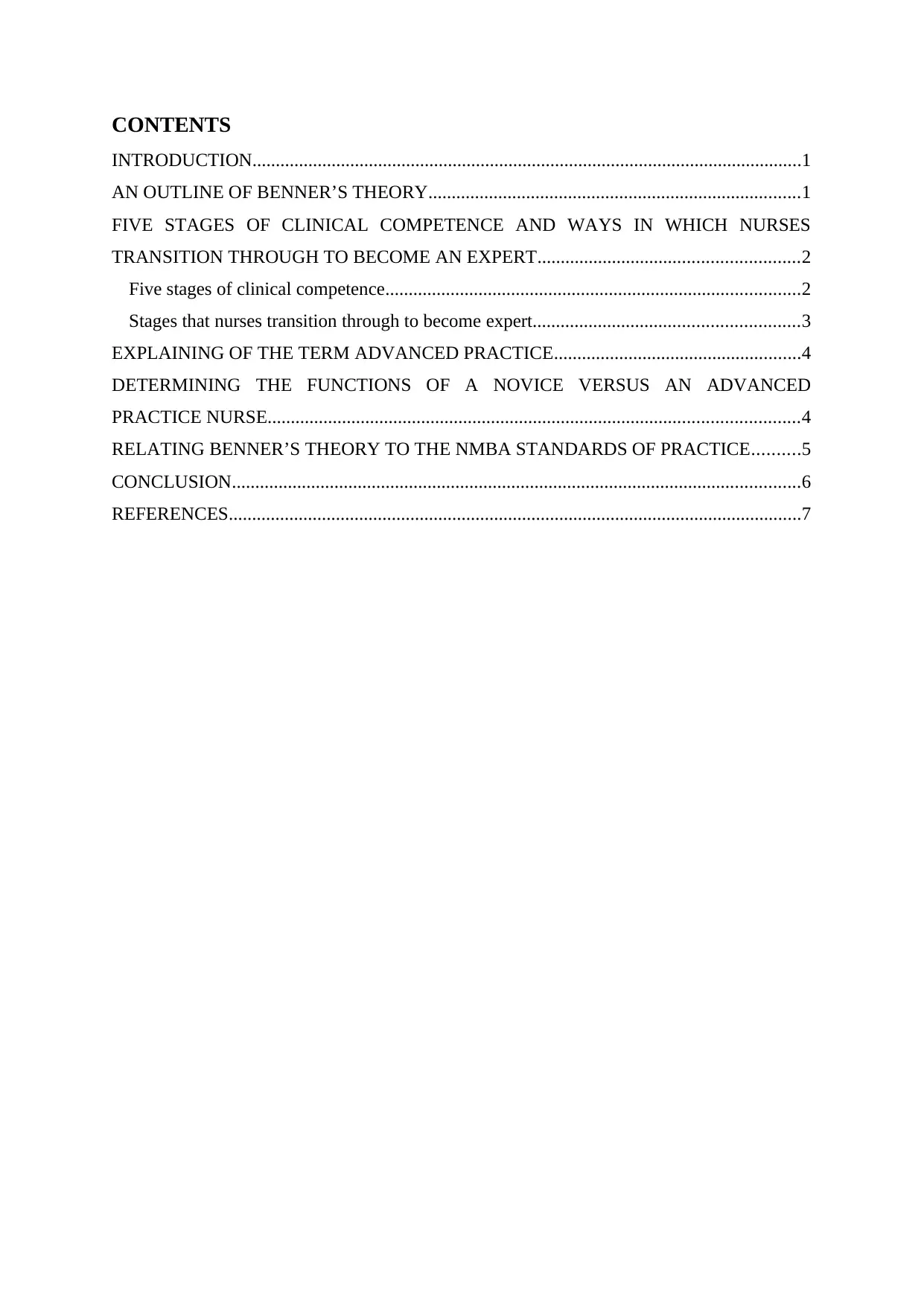
CONTENTS
INTRODUCTION......................................................................................................................1
AN OUTLINE OF BENNER’S THEORY................................................................................1
FIVE STAGES OF CLINICAL COMPETENCE AND WAYS IN WHICH NURSES
TRANSITION THROUGH TO BECOME AN EXPERT........................................................2
Five stages of clinical competence.........................................................................................2
Stages that nurses transition through to become expert.........................................................3
EXPLAINING OF THE TERM ADVANCED PRACTICE.....................................................4
DETERMINING THE FUNCTIONS OF A NOVICE VERSUS AN ADVANCED
PRACTICE NURSE..................................................................................................................4
RELATING BENNER’S THEORY TO THE NMBA STANDARDS OF PRACTICE..........5
CONCLUSION..........................................................................................................................6
REFERENCES...........................................................................................................................7
INTRODUCTION......................................................................................................................1
AN OUTLINE OF BENNER’S THEORY................................................................................1
FIVE STAGES OF CLINICAL COMPETENCE AND WAYS IN WHICH NURSES
TRANSITION THROUGH TO BECOME AN EXPERT........................................................2
Five stages of clinical competence.........................................................................................2
Stages that nurses transition through to become expert.........................................................3
EXPLAINING OF THE TERM ADVANCED PRACTICE.....................................................4
DETERMINING THE FUNCTIONS OF A NOVICE VERSUS AN ADVANCED
PRACTICE NURSE..................................................................................................................4
RELATING BENNER’S THEORY TO THE NMBA STANDARDS OF PRACTICE..........5
CONCLUSION..........................................................................................................................6
REFERENCES...........................................................................................................................7
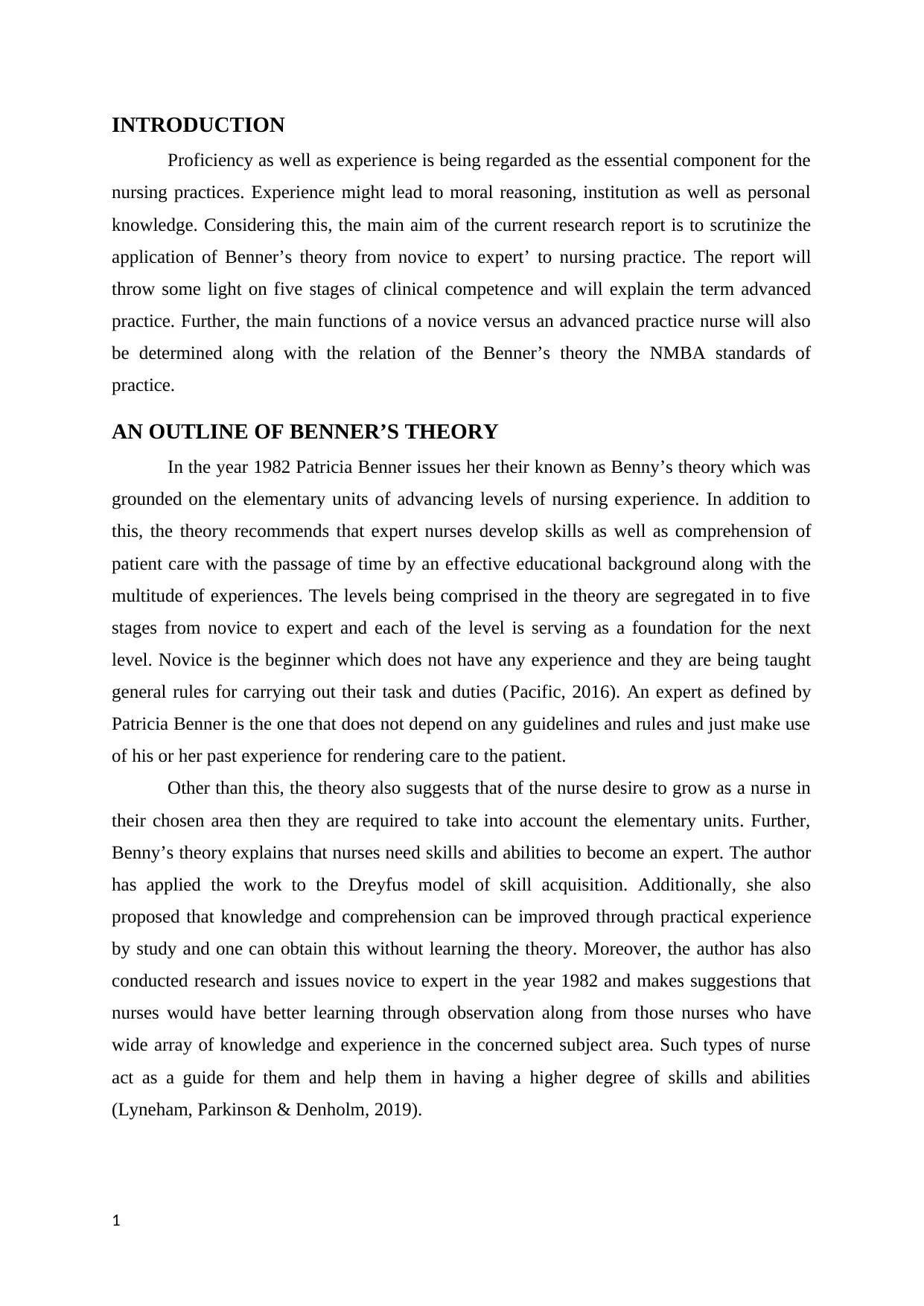
INTRODUCTION
Proficiency as well as experience is being regarded as the essential component for the
nursing practices. Experience might lead to moral reasoning, institution as well as personal
knowledge. Considering this, the main aim of the current research report is to scrutinize the
application of Benner’s theory from novice to expert’ to nursing practice. The report will
throw some light on five stages of clinical competence and will explain the term advanced
practice. Further, the main functions of a novice versus an advanced practice nurse will also
be determined along with the relation of the Benner’s theory the NMBA standards of
practice.
AN OUTLINE OF BENNER’S THEORY
In the year 1982 Patricia Benner issues her their known as Benny’s theory which was
grounded on the elementary units of advancing levels of nursing experience. In addition to
this, the theory recommends that expert nurses develop skills as well as comprehension of
patient care with the passage of time by an effective educational background along with the
multitude of experiences. The levels being comprised in the theory are segregated in to five
stages from novice to expert and each of the level is serving as a foundation for the next
level. Novice is the beginner which does not have any experience and they are being taught
general rules for carrying out their task and duties (Pacific, 2016). An expert as defined by
Patricia Benner is the one that does not depend on any guidelines and rules and just make use
of his or her past experience for rendering care to the patient.
Other than this, the theory also suggests that of the nurse desire to grow as a nurse in
their chosen area then they are required to take into account the elementary units. Further,
Benny’s theory explains that nurses need skills and abilities to become an expert. The author
has applied the work to the Dreyfus model of skill acquisition. Additionally, she also
proposed that knowledge and comprehension can be improved through practical experience
by study and one can obtain this without learning the theory. Moreover, the author has also
conducted research and issues novice to expert in the year 1982 and makes suggestions that
nurses would have better learning through observation along from those nurses who have
wide array of knowledge and experience in the concerned subject area. Such types of nurse
act as a guide for them and help them in having a higher degree of skills and abilities
(Lyneham, Parkinson & Denholm, 2019).
1
Proficiency as well as experience is being regarded as the essential component for the
nursing practices. Experience might lead to moral reasoning, institution as well as personal
knowledge. Considering this, the main aim of the current research report is to scrutinize the
application of Benner’s theory from novice to expert’ to nursing practice. The report will
throw some light on five stages of clinical competence and will explain the term advanced
practice. Further, the main functions of a novice versus an advanced practice nurse will also
be determined along with the relation of the Benner’s theory the NMBA standards of
practice.
AN OUTLINE OF BENNER’S THEORY
In the year 1982 Patricia Benner issues her their known as Benny’s theory which was
grounded on the elementary units of advancing levels of nursing experience. In addition to
this, the theory recommends that expert nurses develop skills as well as comprehension of
patient care with the passage of time by an effective educational background along with the
multitude of experiences. The levels being comprised in the theory are segregated in to five
stages from novice to expert and each of the level is serving as a foundation for the next
level. Novice is the beginner which does not have any experience and they are being taught
general rules for carrying out their task and duties (Pacific, 2016). An expert as defined by
Patricia Benner is the one that does not depend on any guidelines and rules and just make use
of his or her past experience for rendering care to the patient.
Other than this, the theory also suggests that of the nurse desire to grow as a nurse in
their chosen area then they are required to take into account the elementary units. Further,
Benny’s theory explains that nurses need skills and abilities to become an expert. The author
has applied the work to the Dreyfus model of skill acquisition. Additionally, she also
proposed that knowledge and comprehension can be improved through practical experience
by study and one can obtain this without learning the theory. Moreover, the author has also
conducted research and issues novice to expert in the year 1982 and makes suggestions that
nurses would have better learning through observation along from those nurses who have
wide array of knowledge and experience in the concerned subject area. Such types of nurse
act as a guide for them and help them in having a higher degree of skills and abilities
(Lyneham, Parkinson & Denholm, 2019).
1
⊘ This is a preview!⊘
Do you want full access?
Subscribe today to unlock all pages.

Trusted by 1+ million students worldwide
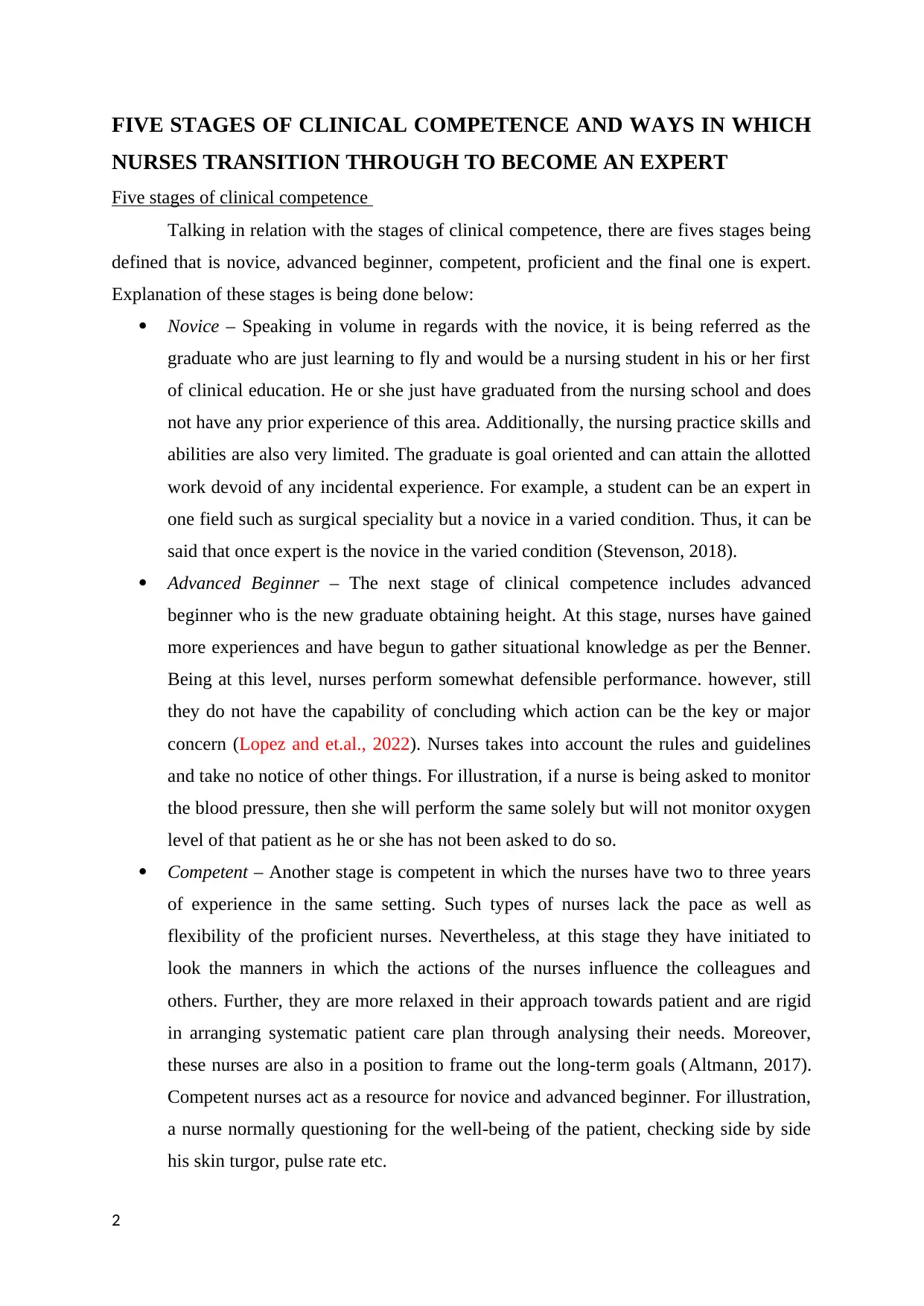
FIVE STAGES OF CLINICAL COMPETENCE AND WAYS IN WHICH
NURSES TRANSITION THROUGH TO BECOME AN EXPERT
Five stages of clinical competence
Talking in relation with the stages of clinical competence, there are fives stages being
defined that is novice, advanced beginner, competent, proficient and the final one is expert.
Explanation of these stages is being done below:
Novice – Speaking in volume in regards with the novice, it is being referred as the
graduate who are just learning to fly and would be a nursing student in his or her first
of clinical education. He or she just have graduated from the nursing school and does
not have any prior experience of this area. Additionally, the nursing practice skills and
abilities are also very limited. The graduate is goal oriented and can attain the allotted
work devoid of any incidental experience. For example, a student can be an expert in
one field such as surgical speciality but a novice in a varied condition. Thus, it can be
said that once expert is the novice in the varied condition (Stevenson, 2018).
Advanced Beginner – The next stage of clinical competence includes advanced
beginner who is the new graduate obtaining height. At this stage, nurses have gained
more experiences and have begun to gather situational knowledge as per the Benner.
Being at this level, nurses perform somewhat defensible performance. however, still
they do not have the capability of concluding which action can be the key or major
concern (Lopez and et.al., 2022). Nurses takes into account the rules and guidelines
and take no notice of other things. For illustration, if a nurse is being asked to monitor
the blood pressure, then she will perform the same solely but will not monitor oxygen
level of that patient as he or she has not been asked to do so.
Competent – Another stage is competent in which the nurses have two to three years
of experience in the same setting. Such types of nurses lack the pace as well as
flexibility of the proficient nurses. Nevertheless, at this stage they have initiated to
look the manners in which the actions of the nurses influence the colleagues and
others. Further, they are more relaxed in their approach towards patient and are rigid
in arranging systematic patient care plan through analysing their needs. Moreover,
these nurses are also in a position to frame out the long-term goals (Altmann, 2017).
Competent nurses act as a resource for novice and advanced beginner. For illustration,
a nurse normally questioning for the well-being of the patient, checking side by side
his skin turgor, pulse rate etc.
2
NURSES TRANSITION THROUGH TO BECOME AN EXPERT
Five stages of clinical competence
Talking in relation with the stages of clinical competence, there are fives stages being
defined that is novice, advanced beginner, competent, proficient and the final one is expert.
Explanation of these stages is being done below:
Novice – Speaking in volume in regards with the novice, it is being referred as the
graduate who are just learning to fly and would be a nursing student in his or her first
of clinical education. He or she just have graduated from the nursing school and does
not have any prior experience of this area. Additionally, the nursing practice skills and
abilities are also very limited. The graduate is goal oriented and can attain the allotted
work devoid of any incidental experience. For example, a student can be an expert in
one field such as surgical speciality but a novice in a varied condition. Thus, it can be
said that once expert is the novice in the varied condition (Stevenson, 2018).
Advanced Beginner – The next stage of clinical competence includes advanced
beginner who is the new graduate obtaining height. At this stage, nurses have gained
more experiences and have begun to gather situational knowledge as per the Benner.
Being at this level, nurses perform somewhat defensible performance. however, still
they do not have the capability of concluding which action can be the key or major
concern (Lopez and et.al., 2022). Nurses takes into account the rules and guidelines
and take no notice of other things. For illustration, if a nurse is being asked to monitor
the blood pressure, then she will perform the same solely but will not monitor oxygen
level of that patient as he or she has not been asked to do so.
Competent – Another stage is competent in which the nurses have two to three years
of experience in the same setting. Such types of nurses lack the pace as well as
flexibility of the proficient nurses. Nevertheless, at this stage they have initiated to
look the manners in which the actions of the nurses influence the colleagues and
others. Further, they are more relaxed in their approach towards patient and are rigid
in arranging systematic patient care plan through analysing their needs. Moreover,
these nurses are also in a position to frame out the long-term goals (Altmann, 2017).
Competent nurses act as a resource for novice and advanced beginner. For illustration,
a nurse normally questioning for the well-being of the patient, checking side by side
his skin turgor, pulse rate etc.
2
Paraphrase This Document
Need a fresh take? Get an instant paraphrase of this document with our AI Paraphraser
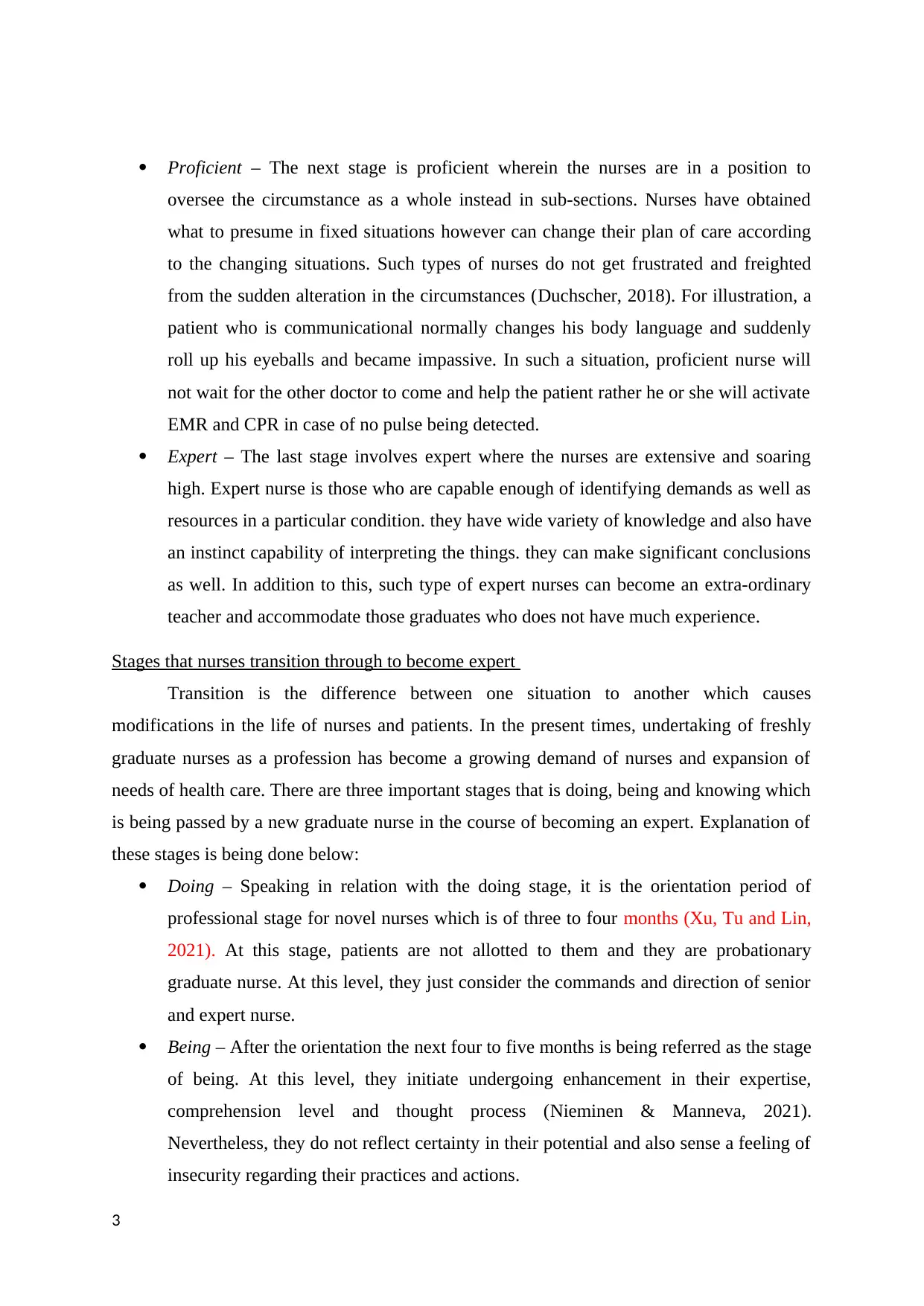
Proficient – The next stage is proficient wherein the nurses are in a position to
oversee the circumstance as a whole instead in sub-sections. Nurses have obtained
what to presume in fixed situations however can change their plan of care according
to the changing situations. Such types of nurses do not get frustrated and freighted
from the sudden alteration in the circumstances (Duchscher, 2018). For illustration, a
patient who is communicational normally changes his body language and suddenly
roll up his eyeballs and became impassive. In such a situation, proficient nurse will
not wait for the other doctor to come and help the patient rather he or she will activate
EMR and CPR in case of no pulse being detected.
Expert – The last stage involves expert where the nurses are extensive and soaring
high. Expert nurse is those who are capable enough of identifying demands as well as
resources in a particular condition. they have wide variety of knowledge and also have
an instinct capability of interpreting the things. they can make significant conclusions
as well. In addition to this, such type of expert nurses can become an extra-ordinary
teacher and accommodate those graduates who does not have much experience.
Stages that nurses transition through to become expert
Transition is the difference between one situation to another which causes
modifications in the life of nurses and patients. In the present times, undertaking of freshly
graduate nurses as a profession has become a growing demand of nurses and expansion of
needs of health care. There are three important stages that is doing, being and knowing which
is being passed by a new graduate nurse in the course of becoming an expert. Explanation of
these stages is being done below:
Doing – Speaking in relation with the doing stage, it is the orientation period of
professional stage for novel nurses which is of three to four months (Xu, Tu and Lin,
2021). At this stage, patients are not allotted to them and they are probationary
graduate nurse. At this level, they just consider the commands and direction of senior
and expert nurse.
Being – After the orientation the next four to five months is being referred as the stage
of being. At this level, they initiate undergoing enhancement in their expertise,
comprehension level and thought process (Nieminen & Manneva, 2021).
Nevertheless, they do not reflect certainty in their potential and also sense a feeling of
insecurity regarding their practices and actions.
3
oversee the circumstance as a whole instead in sub-sections. Nurses have obtained
what to presume in fixed situations however can change their plan of care according
to the changing situations. Such types of nurses do not get frustrated and freighted
from the sudden alteration in the circumstances (Duchscher, 2018). For illustration, a
patient who is communicational normally changes his body language and suddenly
roll up his eyeballs and became impassive. In such a situation, proficient nurse will
not wait for the other doctor to come and help the patient rather he or she will activate
EMR and CPR in case of no pulse being detected.
Expert – The last stage involves expert where the nurses are extensive and soaring
high. Expert nurse is those who are capable enough of identifying demands as well as
resources in a particular condition. they have wide variety of knowledge and also have
an instinct capability of interpreting the things. they can make significant conclusions
as well. In addition to this, such type of expert nurses can become an extra-ordinary
teacher and accommodate those graduates who does not have much experience.
Stages that nurses transition through to become expert
Transition is the difference between one situation to another which causes
modifications in the life of nurses and patients. In the present times, undertaking of freshly
graduate nurses as a profession has become a growing demand of nurses and expansion of
needs of health care. There are three important stages that is doing, being and knowing which
is being passed by a new graduate nurse in the course of becoming an expert. Explanation of
these stages is being done below:
Doing – Speaking in relation with the doing stage, it is the orientation period of
professional stage for novel nurses which is of three to four months (Xu, Tu and Lin,
2021). At this stage, patients are not allotted to them and they are probationary
graduate nurse. At this level, they just consider the commands and direction of senior
and expert nurse.
Being – After the orientation the next four to five months is being referred as the stage
of being. At this level, they initiate undergoing enhancement in their expertise,
comprehension level and thought process (Nieminen & Manneva, 2021).
Nevertheless, they do not reflect certainty in their potential and also sense a feeling of
insecurity regarding their practices and actions.
3
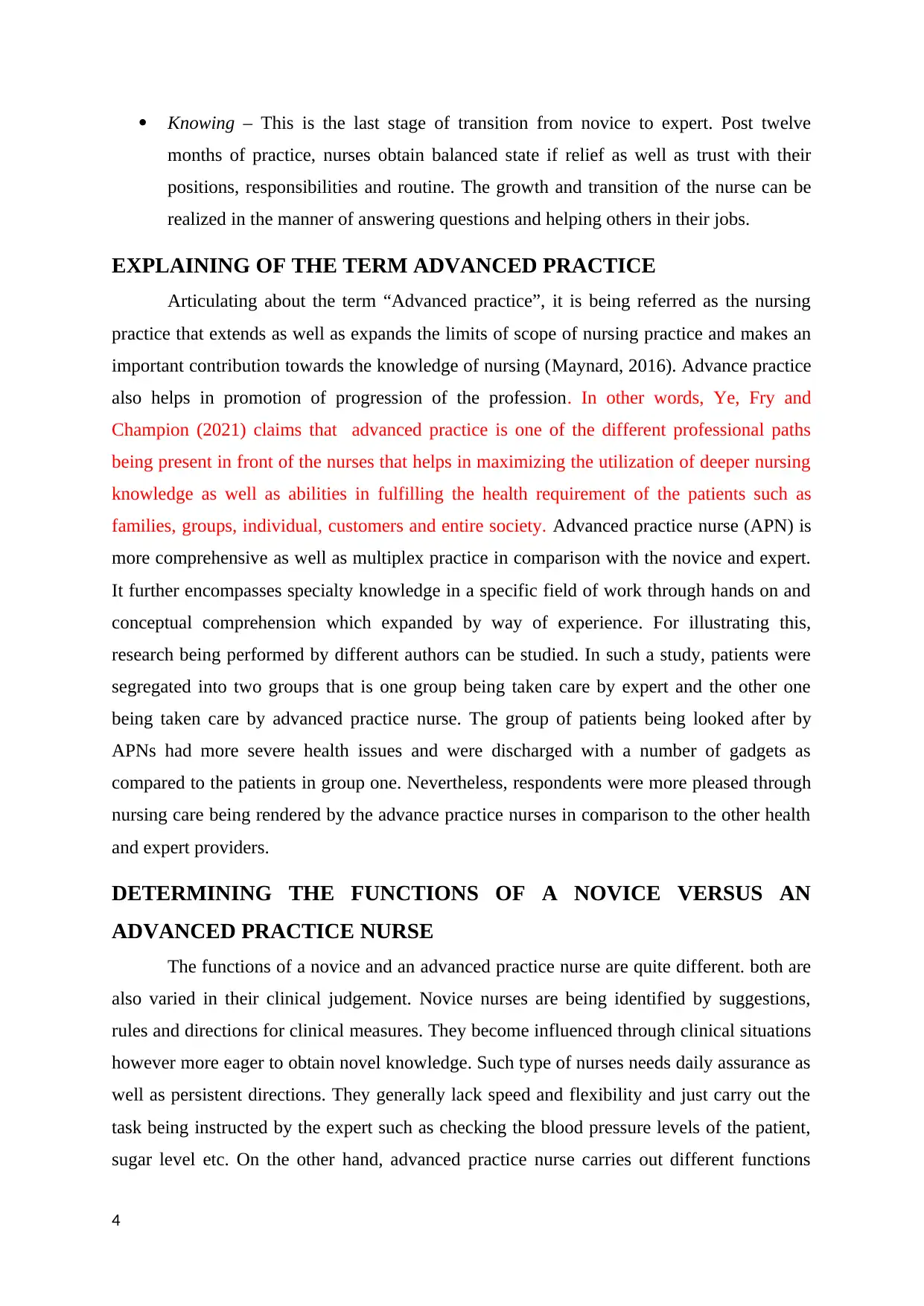
Knowing – This is the last stage of transition from novice to expert. Post twelve
months of practice, nurses obtain balanced state if relief as well as trust with their
positions, responsibilities and routine. The growth and transition of the nurse can be
realized in the manner of answering questions and helping others in their jobs.
EXPLAINING OF THE TERM ADVANCED PRACTICE
Articulating about the term “Advanced practice”, it is being referred as the nursing
practice that extends as well as expands the limits of scope of nursing practice and makes an
important contribution towards the knowledge of nursing (Maynard, 2016). Advance practice
also helps in promotion of progression of the profession. In other words, Ye, Fry and
Champion (2021) claims that advanced practice is one of the different professional paths
being present in front of the nurses that helps in maximizing the utilization of deeper nursing
knowledge as well as abilities in fulfilling the health requirement of the patients such as
families, groups, individual, customers and entire society. Advanced practice nurse (APN) is
more comprehensive as well as multiplex practice in comparison with the novice and expert.
It further encompasses specialty knowledge in a specific field of work through hands on and
conceptual comprehension which expanded by way of experience. For illustrating this,
research being performed by different authors can be studied. In such a study, patients were
segregated into two groups that is one group being taken care by expert and the other one
being taken care by advanced practice nurse. The group of patients being looked after by
APNs had more severe health issues and were discharged with a number of gadgets as
compared to the patients in group one. Nevertheless, respondents were more pleased through
nursing care being rendered by the advance practice nurses in comparison to the other health
and expert providers.
DETERMINING THE FUNCTIONS OF A NOVICE VERSUS AN
ADVANCED PRACTICE NURSE
The functions of a novice and an advanced practice nurse are quite different. both are
also varied in their clinical judgement. Novice nurses are being identified by suggestions,
rules and directions for clinical measures. They become influenced through clinical situations
however more eager to obtain novel knowledge. Such type of nurses needs daily assurance as
well as persistent directions. They generally lack speed and flexibility and just carry out the
task being instructed by the expert such as checking the blood pressure levels of the patient,
sugar level etc. On the other hand, advanced practice nurse carries out different functions
4
months of practice, nurses obtain balanced state if relief as well as trust with their
positions, responsibilities and routine. The growth and transition of the nurse can be
realized in the manner of answering questions and helping others in their jobs.
EXPLAINING OF THE TERM ADVANCED PRACTICE
Articulating about the term “Advanced practice”, it is being referred as the nursing
practice that extends as well as expands the limits of scope of nursing practice and makes an
important contribution towards the knowledge of nursing (Maynard, 2016). Advance practice
also helps in promotion of progression of the profession. In other words, Ye, Fry and
Champion (2021) claims that advanced practice is one of the different professional paths
being present in front of the nurses that helps in maximizing the utilization of deeper nursing
knowledge as well as abilities in fulfilling the health requirement of the patients such as
families, groups, individual, customers and entire society. Advanced practice nurse (APN) is
more comprehensive as well as multiplex practice in comparison with the novice and expert.
It further encompasses specialty knowledge in a specific field of work through hands on and
conceptual comprehension which expanded by way of experience. For illustrating this,
research being performed by different authors can be studied. In such a study, patients were
segregated into two groups that is one group being taken care by expert and the other one
being taken care by advanced practice nurse. The group of patients being looked after by
APNs had more severe health issues and were discharged with a number of gadgets as
compared to the patients in group one. Nevertheless, respondents were more pleased through
nursing care being rendered by the advance practice nurses in comparison to the other health
and expert providers.
DETERMINING THE FUNCTIONS OF A NOVICE VERSUS AN
ADVANCED PRACTICE NURSE
The functions of a novice and an advanced practice nurse are quite different. both are
also varied in their clinical judgement. Novice nurses are being identified by suggestions,
rules and directions for clinical measures. They become influenced through clinical situations
however more eager to obtain novel knowledge. Such type of nurses needs daily assurance as
well as persistent directions. They generally lack speed and flexibility and just carry out the
task being instructed by the expert such as checking the blood pressure levels of the patient,
sugar level etc. On the other hand, advanced practice nurse carries out different functions
4
⊘ This is a preview!⊘
Do you want full access?
Subscribe today to unlock all pages.

Trusted by 1+ million students worldwide
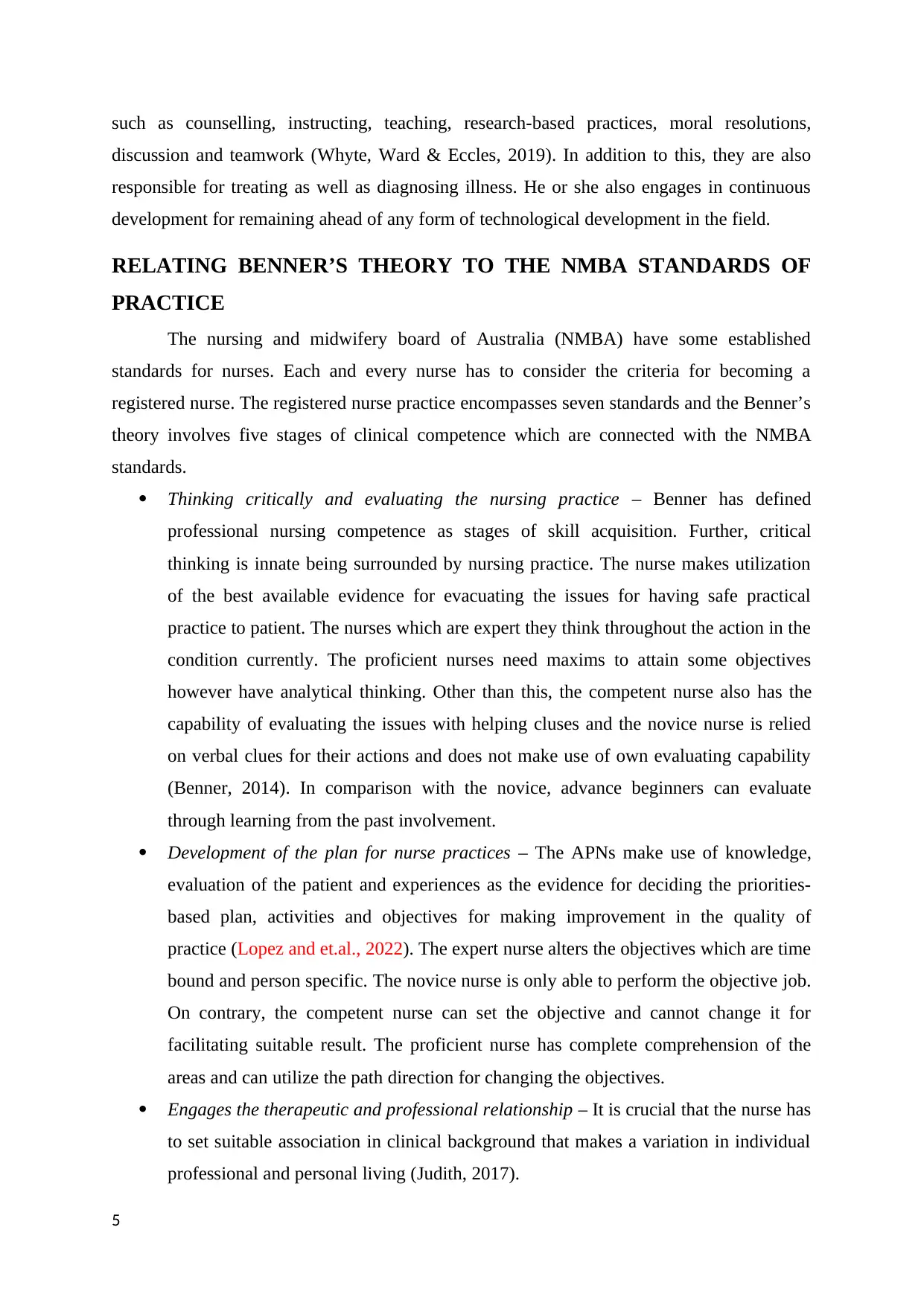
such as counselling, instructing, teaching, research-based practices, moral resolutions,
discussion and teamwork (Whyte, Ward & Eccles, 2019). In addition to this, they are also
responsible for treating as well as diagnosing illness. He or she also engages in continuous
development for remaining ahead of any form of technological development in the field.
RELATING BENNER’S THEORY TO THE NMBA STANDARDS OF
PRACTICE
The nursing and midwifery board of Australia (NMBA) have some established
standards for nurses. Each and every nurse has to consider the criteria for becoming a
registered nurse. The registered nurse practice encompasses seven standards and the Benner’s
theory involves five stages of clinical competence which are connected with the NMBA
standards.
Thinking critically and evaluating the nursing practice – Benner has defined
professional nursing competence as stages of skill acquisition. Further, critical
thinking is innate being surrounded by nursing practice. The nurse makes utilization
of the best available evidence for evacuating the issues for having safe practical
practice to patient. The nurses which are expert they think throughout the action in the
condition currently. The proficient nurses need maxims to attain some objectives
however have analytical thinking. Other than this, the competent nurse also has the
capability of evaluating the issues with helping cluses and the novice nurse is relied
on verbal clues for their actions and does not make use of own evaluating capability
(Benner, 2014). In comparison with the novice, advance beginners can evaluate
through learning from the past involvement.
Development of the plan for nurse practices – The APNs make use of knowledge,
evaluation of the patient and experiences as the evidence for deciding the priorities-
based plan, activities and objectives for making improvement in the quality of
practice (Lopez and et.al., 2022). The expert nurse alters the objectives which are time
bound and person specific. The novice nurse is only able to perform the objective job.
On contrary, the competent nurse can set the objective and cannot change it for
facilitating suitable result. The proficient nurse has complete comprehension of the
areas and can utilize the path direction for changing the objectives.
Engages the therapeutic and professional relationship – It is crucial that the nurse has
to set suitable association in clinical background that makes a variation in individual
professional and personal living (Judith, 2017).
5
discussion and teamwork (Whyte, Ward & Eccles, 2019). In addition to this, they are also
responsible for treating as well as diagnosing illness. He or she also engages in continuous
development for remaining ahead of any form of technological development in the field.
RELATING BENNER’S THEORY TO THE NMBA STANDARDS OF
PRACTICE
The nursing and midwifery board of Australia (NMBA) have some established
standards for nurses. Each and every nurse has to consider the criteria for becoming a
registered nurse. The registered nurse practice encompasses seven standards and the Benner’s
theory involves five stages of clinical competence which are connected with the NMBA
standards.
Thinking critically and evaluating the nursing practice – Benner has defined
professional nursing competence as stages of skill acquisition. Further, critical
thinking is innate being surrounded by nursing practice. The nurse makes utilization
of the best available evidence for evacuating the issues for having safe practical
practice to patient. The nurses which are expert they think throughout the action in the
condition currently. The proficient nurses need maxims to attain some objectives
however have analytical thinking. Other than this, the competent nurse also has the
capability of evaluating the issues with helping cluses and the novice nurse is relied
on verbal clues for their actions and does not make use of own evaluating capability
(Benner, 2014). In comparison with the novice, advance beginners can evaluate
through learning from the past involvement.
Development of the plan for nurse practices – The APNs make use of knowledge,
evaluation of the patient and experiences as the evidence for deciding the priorities-
based plan, activities and objectives for making improvement in the quality of
practice (Lopez and et.al., 2022). The expert nurse alters the objectives which are time
bound and person specific. The novice nurse is only able to perform the objective job.
On contrary, the competent nurse can set the objective and cannot change it for
facilitating suitable result. The proficient nurse has complete comprehension of the
areas and can utilize the path direction for changing the objectives.
Engages the therapeutic and professional relationship – It is crucial that the nurse has
to set suitable association in clinical background that makes a variation in individual
professional and personal living (Judith, 2017).
5
Paraphrase This Document
Need a fresh take? Get an instant paraphrase of this document with our AI Paraphraser
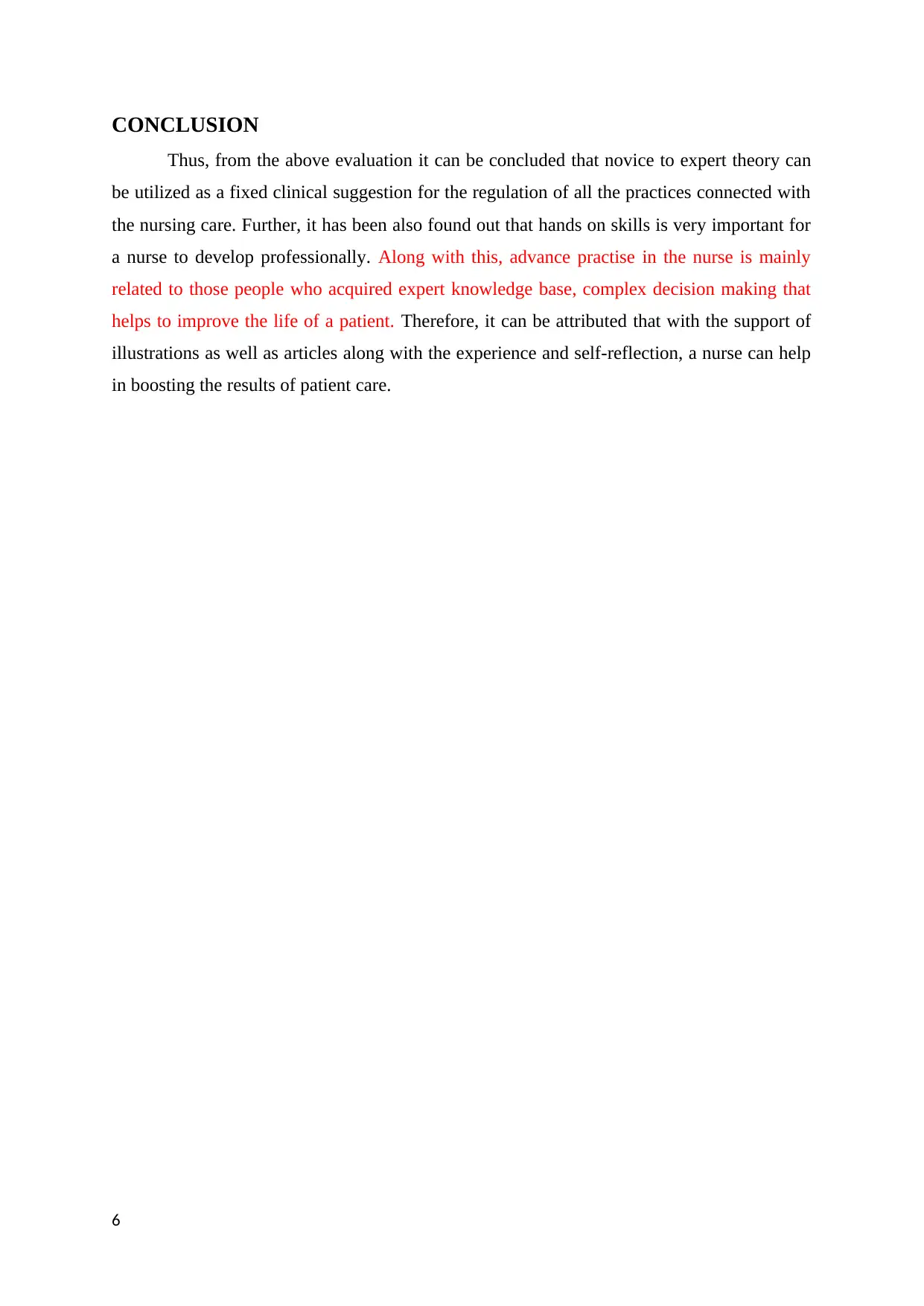
CONCLUSION
Thus, from the above evaluation it can be concluded that novice to expert theory can
be utilized as a fixed clinical suggestion for the regulation of all the practices connected with
the nursing care. Further, it has been also found out that hands on skills is very important for
a nurse to develop professionally. Along with this, advance practise in the nurse is mainly
related to those people who acquired expert knowledge base, complex decision making that
helps to improve the life of a patient. Therefore, it can be attributed that with the support of
illustrations as well as articles along with the experience and self-reflection, a nurse can help
in boosting the results of patient care.
6
Thus, from the above evaluation it can be concluded that novice to expert theory can
be utilized as a fixed clinical suggestion for the regulation of all the practices connected with
the nursing care. Further, it has been also found out that hands on skills is very important for
a nurse to develop professionally. Along with this, advance practise in the nurse is mainly
related to those people who acquired expert knowledge base, complex decision making that
helps to improve the life of a patient. Therefore, it can be attributed that with the support of
illustrations as well as articles along with the experience and self-reflection, a nurse can help
in boosting the results of patient care.
6
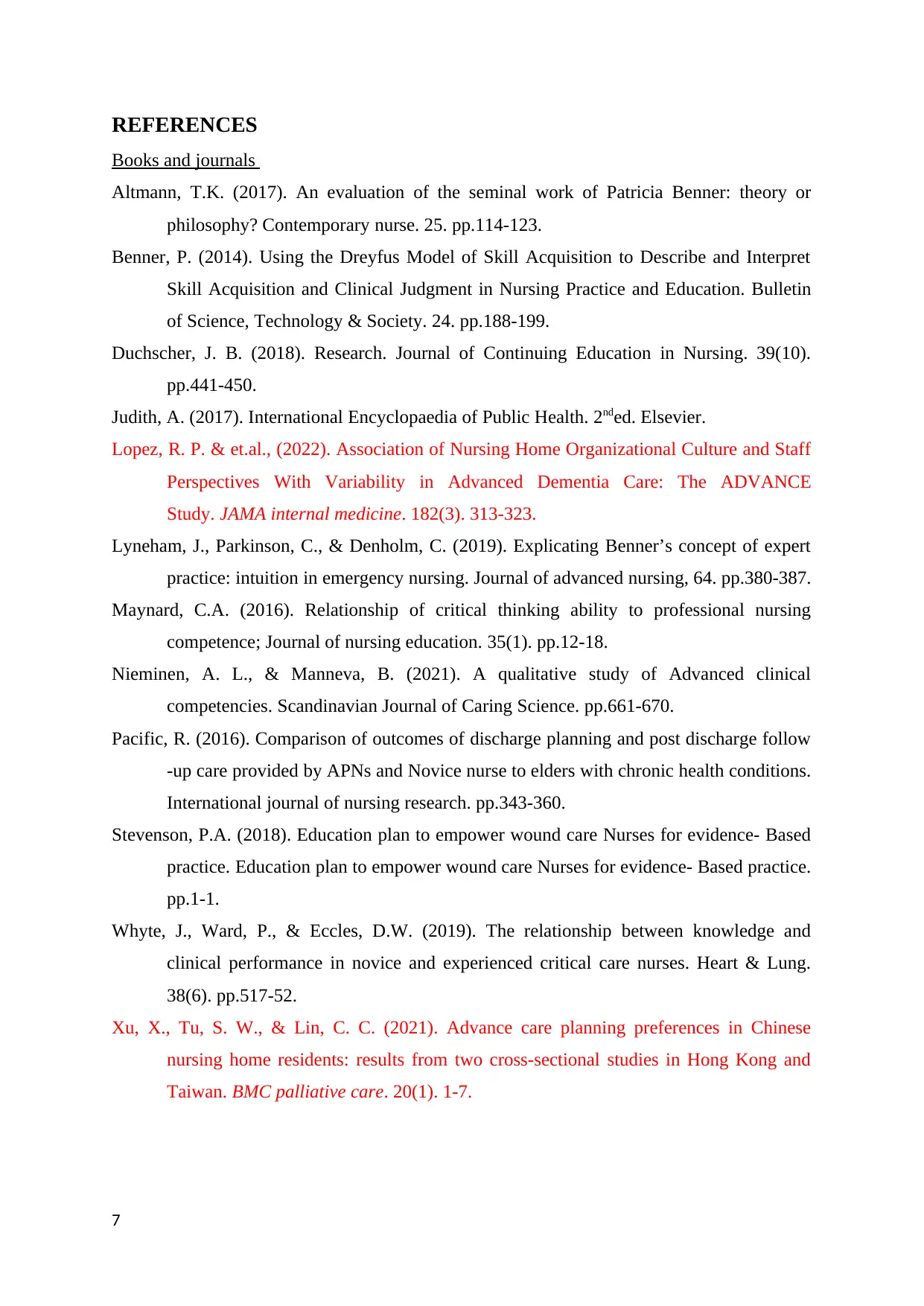
REFERENCES
Books and journals
Altmann, T.K. (2017). An evaluation of the seminal work of Patricia Benner: theory or
philosophy? Contemporary nurse. 25. pp.114-123.
Benner, P. (2014). Using the Dreyfus Model of Skill Acquisition to Describe and Interpret
Skill Acquisition and Clinical Judgment in Nursing Practice and Education. Bulletin
of Science, Technology & Society. 24. pp.188-199.
Duchscher, J. B. (2018). Research. Journal of Continuing Education in Nursing. 39(10).
pp.441-450.
Judith, A. (2017). International Encyclopaedia of Public Health. 2nded. Elsevier.
Lopez, R. P. & et.al., (2022). Association of Nursing Home Organizational Culture and Staff
Perspectives With Variability in Advanced Dementia Care: The ADVANCE
Study. JAMA internal medicine. 182(3). 313-323.
Lyneham, J., Parkinson, C., & Denholm, C. (2019). Explicating Benner’s concept of expert
practice: intuition in emergency nursing. Journal of advanced nursing, 64. pp.380-387.
Maynard, C.A. (2016). Relationship of critical thinking ability to professional nursing
competence; Journal of nursing education. 35(1). pp.12-18.
Nieminen, A. L., & Manneva, B. (2021). A qualitative study of Advanced clinical
competencies. Scandinavian Journal of Caring Science. pp.661-670.
Pacific, R. (2016). Comparison of outcomes of discharge planning and post discharge follow
-up care provided by APNs and Novice nurse to elders with chronic health conditions.
International journal of nursing research. pp.343-360.
Stevenson, P.A. (2018). Education plan to empower wound care Nurses for evidence- Based
practice. Education plan to empower wound care Nurses for evidence- Based practice.
pp.1-1.
Whyte, J., Ward, P., & Eccles, D.W. (2019). The relationship between knowledge and
clinical performance in novice and experienced critical care nurses. Heart & Lung.
38(6). pp.517-52.
Xu, X., Tu, S. W., & Lin, C. C. (2021). Advance care planning preferences in Chinese
nursing home residents: results from two cross-sectional studies in Hong Kong and
Taiwan. BMC palliative care. 20(1). 1-7.
7
Books and journals
Altmann, T.K. (2017). An evaluation of the seminal work of Patricia Benner: theory or
philosophy? Contemporary nurse. 25. pp.114-123.
Benner, P. (2014). Using the Dreyfus Model of Skill Acquisition to Describe and Interpret
Skill Acquisition and Clinical Judgment in Nursing Practice and Education. Bulletin
of Science, Technology & Society. 24. pp.188-199.
Duchscher, J. B. (2018). Research. Journal of Continuing Education in Nursing. 39(10).
pp.441-450.
Judith, A. (2017). International Encyclopaedia of Public Health. 2nded. Elsevier.
Lopez, R. P. & et.al., (2022). Association of Nursing Home Organizational Culture and Staff
Perspectives With Variability in Advanced Dementia Care: The ADVANCE
Study. JAMA internal medicine. 182(3). 313-323.
Lyneham, J., Parkinson, C., & Denholm, C. (2019). Explicating Benner’s concept of expert
practice: intuition in emergency nursing. Journal of advanced nursing, 64. pp.380-387.
Maynard, C.A. (2016). Relationship of critical thinking ability to professional nursing
competence; Journal of nursing education. 35(1). pp.12-18.
Nieminen, A. L., & Manneva, B. (2021). A qualitative study of Advanced clinical
competencies. Scandinavian Journal of Caring Science. pp.661-670.
Pacific, R. (2016). Comparison of outcomes of discharge planning and post discharge follow
-up care provided by APNs and Novice nurse to elders with chronic health conditions.
International journal of nursing research. pp.343-360.
Stevenson, P.A. (2018). Education plan to empower wound care Nurses for evidence- Based
practice. Education plan to empower wound care Nurses for evidence- Based practice.
pp.1-1.
Whyte, J., Ward, P., & Eccles, D.W. (2019). The relationship between knowledge and
clinical performance in novice and experienced critical care nurses. Heart & Lung.
38(6). pp.517-52.
Xu, X., Tu, S. W., & Lin, C. C. (2021). Advance care planning preferences in Chinese
nursing home residents: results from two cross-sectional studies in Hong Kong and
Taiwan. BMC palliative care. 20(1). 1-7.
7
⊘ This is a preview!⊘
Do you want full access?
Subscribe today to unlock all pages.

Trusted by 1+ million students worldwide
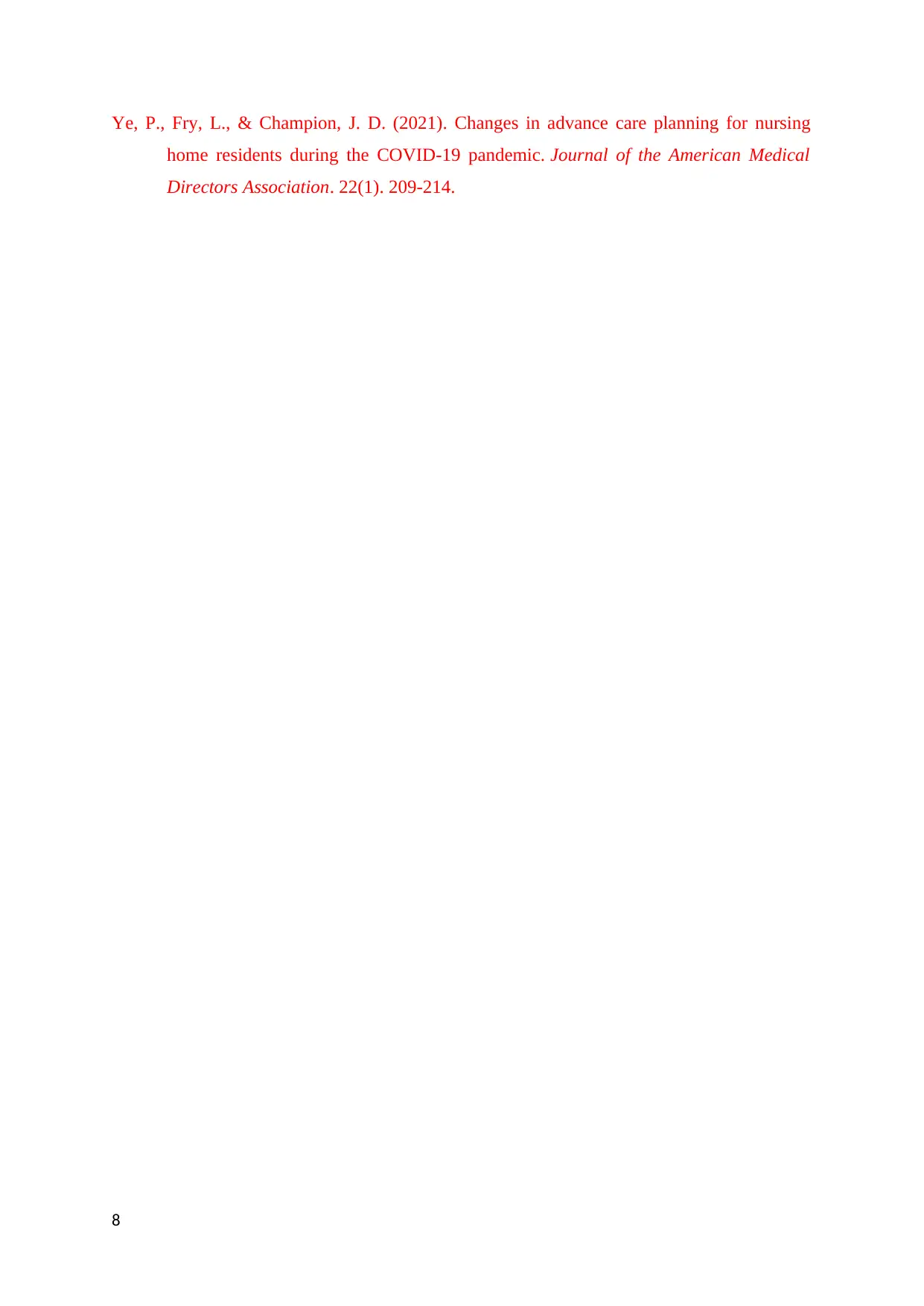
Ye, P., Fry, L., & Champion, J. D. (2021). Changes in advance care planning for nursing
home residents during the COVID-19 pandemic. Journal of the American Medical
Directors Association. 22(1). 209-214.
8
home residents during the COVID-19 pandemic. Journal of the American Medical
Directors Association. 22(1). 209-214.
8
1 out of 10
Related Documents
Your All-in-One AI-Powered Toolkit for Academic Success.
+13062052269
info@desklib.com
Available 24*7 on WhatsApp / Email
![[object Object]](/_next/static/media/star-bottom.7253800d.svg)
Unlock your academic potential
Copyright © 2020–2026 A2Z Services. All Rights Reserved. Developed and managed by ZUCOL.





